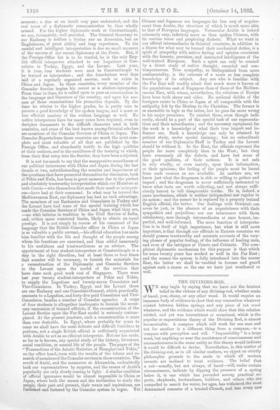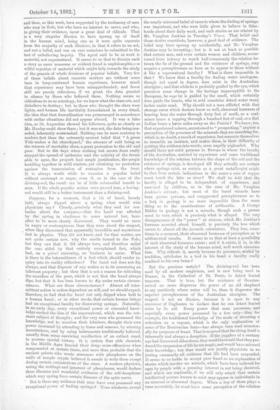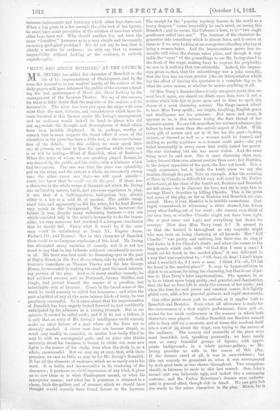THE DIVINING-ROD.
WE May begin by saying that we have not the faintest belief in the virtues of any divining-rod, whether made of hazel, yew, ebony, or any other wood. It would require an immense body of evidence to show that any connection whatever existed between hidden springs and .any piece of cut wood whatever, and the evidence which would show that this relation existed, and yet was intermittent or occasional, which is the popular or superstitious theory of the Divining Rod, is almost inconceivable. A compass which will work for one man and not for another is a different thing from a compass,—is compass with perception and will. "Impossibility" is a large word, but anything so near the coexistence of consciousness and unconsciousness in the same entity as this theory would indicate it would be difficult to devise. Nevertheless, in this matter of the divining-rod, as in all similar matters, we oIject on strictly philosophic grounds to the mode in which all modern savants are inclined to treat evidence. The belief that a rod—usually, but not always, of hazel—will, under certain circumstances, indicate by dipping the presence of a spring below it, is one which has prevailed among practical ex- perts, shepherds, husbandmen, builders, and others who are compelled to search for water, for ages, has withstood the most determined censures of a trusted Church, and has every now and then, as this week, been supported by the testimony of meu who may be fools, but who have no interest to serve, and who, in giving their evidence, incur a great deal of ridicule. That is a very singular illusion to have sprung up of itself in the human mind, being one as it were quite separate from the majority of such illusions, in that it refers to an act, and not a belief, and can on rare occasions be submitted to the test of unbelieving inquiry. The agent said to be at work is material, not supernatural. It seems to us that to dismiss such a story as mere nonsense or evident fraud is unphilosophic,—a wilful rejection of material which might help towards the study of the genesis of whole divisions of popular beliefs. Very few of these beliefs about concrete matters are without some base in long-continued human experience, however much that experience may have been misapprehended; and fewer still are purely ridiculous, if we grant the data granted in silence by those who believed them. Nothing seems so ridiculous to us as astrology, for we know what the stars are, and disbelieve in destiny; but to those who thought the stars were lights, and human life inevitably foreordained in every detail, the idea that that foreordination was prearranged in accordance with stellar situations did not appear absurd. It was a false idea, as St. Augustine showed his followers, quite as clearly as Mr. Huxley could show them ; but it was not, the data being con- ceded, inherently nonsensical. Nothing can be more contrary to modern fact than the extremely ancient belief that " A green Yule makes a fat churchyard," the absence of cold being, .as the returns of mortality show, a great protection to the old and poor. But in the days when nothing but severe .frost really stopped the spread of epidemics and the activity of the fevers akin to ague, the proyerb had ample justification, the people huddling together in mild winters, yet obtaining no protection against the transmission of contagion from the frost. It is always worth while to examine a popular belief without contempt or anger, even if, as in the case of the divining-rod, the result can be of little substantial benefit to man. If the whole popular notion were proved true, a boring- rod would still be a better instrument than a divining-rod.
Suppose, for a moment, that a bit of hazel, loosely held; always dipped above a spring, what would • wise physicists say P Clearly, precisely what they said for cen- turies about the corn pass,—that the hazel was affected by the spring in obedience to some natural law, here- after to be more clearly discovered. They would no more be angry or contemptuous than they were about the magnet, when they discovered that apparently incredible and mysterious fact in physics. They did not know, and for that matter, are not quite certain now, why the needle turned to the Pole; but they saw that it did always turn, and therefore sailed the seas aided by that entirely unexplained fact, which had, on a priori reasoning, no business to occur. What is there in the intermittence of a fact which should render in- quiry into its reality ridiculous P The hazel rod does not dip always, and that disposes of any notion as to its possessing an inherent property ; but then that is not a reason for ridiculing the assertion of the poor, which is not that the hazel always dips, but that it has been known to dip under certain circum- stances. What are those circumstances P Almost all inter- mittent action is action dependent on will, and we should expect, therefore, to find that the hazel rod only dipped when held in a human hand ; or in other words, that certain human beings had an exceptional faculty for discovering springs. Naturally, in an early day, every exceptional power or concealed know- ledge excited the idea of the supernatural, which was the con- stant subject of thought ; and the very men who possessed the knowledge, not to mention their fidmirers, thought their own power increased by attending to times and seasons, by uttering incantations, and by using instruments traditionally believed, usually from some surviving recollection of an extinct creed, to possess special virtues. It is certain that able chemists in the Middle Ages fancied their drugs more efficacious when compounded at certain times, and more than probable that the ancient priests who wrote Ontences with phosphorus on the walls of temple crypts believed it unsafe to write them except during certain conjunctions of the stars. A modern physicist, seeing the writings and ignorant of phosphorus, would declare them illusions and wonderful evidences of the self-deceptions which may spring from certain diseases of the optic nerve. But is there any evidence that men have ever possessed any exceptional power of finding springs P None whatever, except the nearly universal belief of races to whom the finding of springs was important, and who were little given to believe in false- hoods about their daily work, and such stories as are related by Mr. Vaughan Jenkins in Tuesday's Times. That belief and those stories constitute, however, a good deal of evidence. The belief may have sprung up accidentally, and Mr. Vaughan Jenkins may be inventing ; but is it not at least as possible that certain men, and even certain women and children, accus- tomed from infancy to watch half-consciously the relation be- tween the lie of the ground and the existence of springs, may acquire a perceptiveness so keen as to appear to those without it like a supernatural faculty P What is there impossible in that P We know that a faculty for finding water analogous, though not equal in degree, does exist in the Australian aborigine ; and that while he is probably guided by the eye, which perceives some change in the herbage imperceptible to the European, he says he is guided by the smell, which certainly does guide the beasts, who in arid countries detect water many inches under sand. Why should not a man afflicted with that strange curse which doctors know so well, abnormal keenness of hearing, hear the water through forty feet of earth, as a coal- miner hears a tapping through a hundred feet of coal, or a Red Indian hears a horse miles away on the Prairie P We know, too, that experienced miners, accustomed to " prospecting," acquire a perception of the presence of the minerals they are searching for, which is, no doubt, a result of experience, but seems to themselves to resemble an instinct, and makes them, in their difficulty of putting the evidence into words, seem angrily pigheaded. Why should there not exist persons in Europe in whom the faculty of the Australian, assisted by experience and some traditional knowledge of the relation between the shape of the soil and the existence of springs, is developed till they actually are certain where springs exist, as certain as a great metallurgist might be that from certain indications in the water a vein• of copper must touch the lake or river P We shall be told that the faculty is alleged to be independent of experience, and exercised by children, as in the case of Mr. Vaughan Jenkius's servant; but most of the hazel wizards have been grown persons, and exaggerated perceptiveness as to a fact in geology is no more impossible than the same
thing as to the combinations of arithmetic. A George Bidder in geology is not 'a miracle, though such a person must be rare, which is precisely what is alleged. The very disappearance of the " power " at sixteen, which Mr. Jenkins's foreman asserted about himself, is precisely the loss which occurs to almost all the juvenile calculators. They lose, some- times in a moment, their abnormal keenness of perception as to arithmetical results. It seems to us that at least a possibility of such abnormal keenness exists ; and if it exists, it is, in the interest of the study of the human mind, well worth examina- tion. Why ridicule it, merely because its possessor, misled by tradition, attributes to a tool in his hand a faculty really confined to his own brain P But the precious metals P The divining•rod has been used by all modern magicians, and is now being used in France, in the Cathedral of St. Denis, to detect buried
treasure. That is true, but the existence of Douster- swivel no more disproves the power of an old shepherd to say positively where water will be, than it' disproves the superior perceptiveness of the Australian aborigine. The magnet is not an illusion, because it is open to any successor of Cagliostro to declare that he can detect buried coins by its aid. Every power that man possesses, and especially every power possessed by a few only—like, for example, the traditional knowledge of the mode of throwing a reflection on a vapour, which is the only explanation of some of the Rosicrucian feats—has always been used occasion- ally for purposes of fraud. That is no proof that the thing itself is inherently and always a deception. If the jugglers of a century ago had discovered chloroform, they would have said that they pro- duced the suspension of life by art magic, and would have misused their knowledge ; but that would not justify physicists in re- jecting summarily all evidence that life had been suspended. It seems to us feeble to accept pure fraud as an explanation of stories which involve no miracle, which have been believed for ages by people with a pressing interest in not being deceived, and which are explicable, if we will only admit that certain intellectual powers known to exist may appear in individuals in an unusual or abnormal degree. When a boy of three plays a tune accurately, he must have some perception of the relation
between instruments and harmony which other boys have not. When a boy gives in a few seconds the cube root of ten figures, he must have some perception of the relation of numbers which other boys have not. Why should another boy not have the same " intuitive " keenneas as to a very simple and incessantly recurring geological problem ? We do not say he has, that is clearly a matter for evidence ; we only say that to assume impossibility without looking at the evidence, is entirely unphilosophic.•




































 Previous page
Previous page